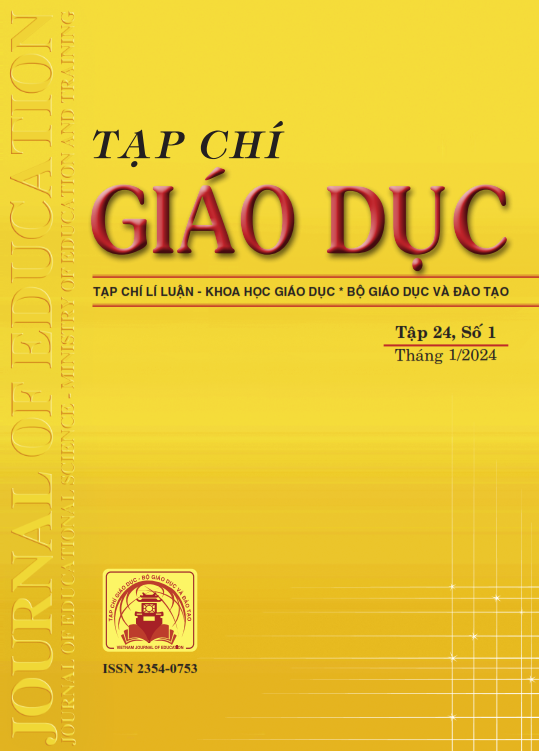Tích hợp nhiệm vụ dự án trong đánh giá năng lực mô hình hoá toán học của học sinh trung học phổ thông
Tóm tắt
Connecting mathematics with real-life situations and other sciences is one of the targeted approaches of education reform in Vietnam. In particular, mathematical modeling is the process of conversion between practical and mathematical problems by creating mathematical models, thereby solving and evaluating the model. Specifically, project-based tasks - the highest practical level (true modeling) can effectively support the development of students’ mathematical modeling competency. The study used the pedagogical experimental research method to integrate project tasks into the classroom and conduct experiments to evaluate students' mathematical modeling capacity. Integrating project tasks into the classroom creates an opportunity for students to experience and solve real-world problems, thereby helping them develop mathematical modeling competency.
Tài liệu tham khảo
Blum, W., Galbraith, P. L., Henn, H-W., & Niss, M. (2007). Modelling and applications in mathematics education. The 14th ICMI Study. Springer.
Bộ GD-ĐT (2018). Chương trình giáo dục phổ thông môn Toán (ban hành kèm theo Thông tư số 32/2018/TT-BGDĐT ngày 26/12/2018 của Bộ trưởng Bộ GD-ĐT).
Đỗ Thị Thanh (2020). Dạy học giải bài toán Xác suất nhằm phát triển năng lực mô hình hóa toán học cho sinh viên khối ngành Kĩ thuật Trường Đại học Công nghiệp Hà Nội. Tạp chí Giáo dục, số đặc biệt kì 1 tháng 5, 131-137.
Greer, B., & Verschaffel, L. (2007). Modelling competencies-Overview. In W. Blum, P. L. Galbraith, H.-W. Henn, & M. Niss (Eds.). Modelling and applications in mathematics education: The 14th ICMI study (pp. 219-224). New York: Springer.
Kaiser, G. (2007). Modelling and modelling competencies in school. In C. Haines, P. Galbraith, W. Blum, & S. Khan (Eds.). Mathematical modelling: Education, engineering and economics (pp. 110-119) (ICMA 12). Chichester: Horwood.
Kaiser, G., & Brand, S. (2015). Modelling competencies: Past development and further perspectives. In G. A. Stillman, W. Blum, & M. S. Biembengut (Eds.). Mathematical modelling in education research and practice (pp. 129-149). Cham: Springer.
Maaß, K. (2006). What are modelling competencies?. ZDM, 38(2), 113-142. http://doi.org/10.1007/bf02655885
Nguyễn Danh Nam (2016). Phương pháp mô hình hóa trong dạy học môn Toán ở trường phổ thông. NXB Đại học Thái Nguyên.
Niss, M. (1987). Applications and Modelling in the Mathematics Curriculum - State and Trends. Int. J. Math. Educ Sci Technol., 18, 487-505.
Palm, T. (2009). Theory of authentic task situations. Words and worlds: Modelling verbal descriptions of situations (pp. 3-20). Rotterdam/Boston/Taipei: Sense Publishers.
Pollak, H. O. (1979). The interaction between Mathematics and other school subjects. New Trends in Mathematics Teaching, IV, Paris: UNESKO.
Tran, D., Nguyen, T. D., Nguyen, T. T. A., Nguyen, T. G. N, & Ta, M. P. (2019). Bridging to Mathematical Modelling: Vietnamese students’ response to different levels of authenticity in contextualized tasks. International Journal of Mathematical Education in Science and Technology, 1-20. http://doi.org/10.1080/0020739X.2019.1648890
Tran, D., Ta, M. P., Nguyen, T. T. A., Nguyen, T. D., & Nguyen, T. G. N. (2016). Authenticity of tasks and students’ problem solving. Paper in TSG 21: Mathematical applications and modeling in the teaching and learning of mathematics, the 13th International Congress on Mathematical Education (ICME), Hamburg, Germany.
Tải xuống
Đã Xuất bản
Cách trích dẫn
Số
Chuyên mục
Giấy phép

Tác phẩm này được cấp phép theo Ghi nhận tác giả của Creative Commons Giấy phép quốc tế 4.0 .












